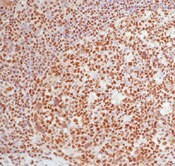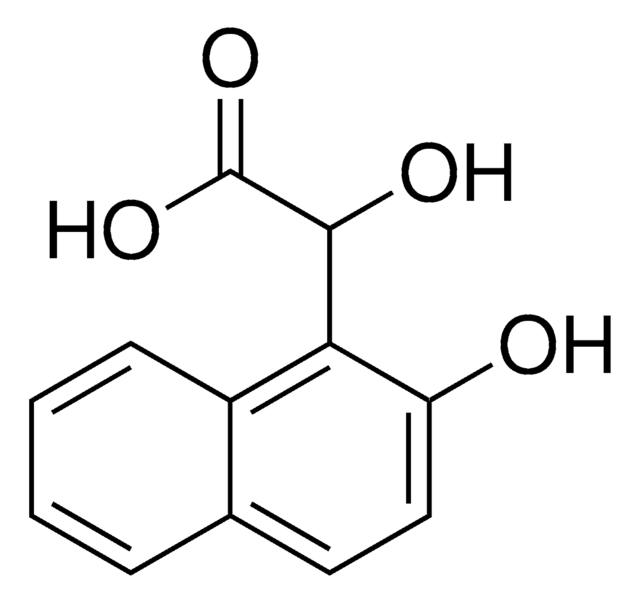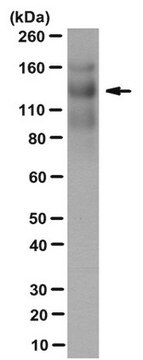NA57
Anti-DNA-PK (Ab-2) Mouse mAb (18-2)
liquid, clone 18-2, Calbiochem®
Synonyme(s) :
Anti-DNA Dependent Protein Kinase
About This Item
Produits recommandés
Source biologique
mouse
Niveau de qualité
Forme d'anticorps
purified antibody
Type de produit anticorps
primary antibodies
Clone
18-2, monoclonal
Forme
liquid
Contient
≤0.1% sodium azide as preservative
Espèces réactives
human
Fabricant/nom de marque
Calbiochem®
Conditions de stockage
OK to freeze
Isotype
IgG1
Conditions d'expédition
wet ice
Température de stockage
2-8°C
Modification post-traductionnelle de la cible
unmodified
Informations sur le gène
human ... PRKDC(5591)
Description générale
Immunogène
Application


Frozen Sections (1:50-1:100)
Immunoblotting (1:250-1:500)
Immunofluorescence (1:50-1:100)
Immunoprecipitation (10 l/mg protein lysate)
Neutralization Studies (see comments)
Paraffin Sections (1:50-1:100, heat/pressure cooker pre-treatment required)
Conditionnement
Avertissement
Forme physique
Reconstitution
Remarque sur l'analyse
A-431, HeLa, or HL-60 cells or normal tonsil, normal colon, or breast carcinoma tissue
Autres remarques
McConnell, K.R., et al. 1997 J. Immunol.158, 2083-2089.
Peterson, S.R., et al. 1997. J. Biol. Chem.272, 10227.
Anderson, C.W. and Carter, T.H. 1996. Curr. Top. Microbiol. Immunol.217, 91.
Blunt, T., et al. 1996. Proc. Natl. Acad. Sci. USA93, 10285.
Carpenter, C.L. and Cantley, L.C. 1996. Curr. Opin. Cell. Biol.8, 153.
Chan, D.W. and Lees-Miller, S.P. 1996. J. Biol. Chem.271, 8936.
Connelly, M.A., et al. 1996. Gene175, 271.
Danska, J.S., et al. 1996. Mol. Cell. Biol.16, 5507.
Han, Z., et al. 1996. J. Biol. Chem.271, 25035.
Lees-Miller, S.P. 1996. Biochem. Cell. Biol.74, 503.
Song, Q., et al. 1996. EMBO J.15, 3238.
Teraoka, H., et al. 1996. FEBS Lett.393, 1.
Blunt, T., et al. 1995. Cell80, 813.
Hartley, K.O., et al. 1995. Cell82, 849.
Kirchgessner, C.U., et al. 1995. Science267, 1178.
Lees-Miller, S.P., et al. 1995. Science267, 1183.
Poltoratsky, V.P., et al. 1995. J. Immunol.155, 4529.
Anderson, C.W. 1993. Trends Biochem. Sci.18, 433.
Gottleib, T.M. and Jackson, S.P. 1993. Cell72, 131.
Informations légales
Vous ne trouvez pas le bon produit ?
Essayez notre Outil de sélection de produits.
Code de la classe de stockage
12 - Non Combustible Liquids
Classe de danger pour l'eau (WGK)
WGK 2
Point d'éclair (°F)
Not applicable
Point d'éclair (°C)
Not applicable
Certificats d'analyse (COA)
Recherchez un Certificats d'analyse (COA) en saisissant le numéro de lot du produit. Les numéros de lot figurent sur l'étiquette du produit après les mots "Lot" ou "Batch".
Déjà en possession de ce produit ?
Retrouvez la documentation relative aux produits que vous avez récemment achetés dans la Bibliothèque de documents.
Notre équipe de scientifiques dispose d'une expérience dans tous les secteurs de la recherche, notamment en sciences de la vie, science des matériaux, synthèse chimique, chromatographie, analyse et dans de nombreux autres domaines..
Contacter notre Service technique








